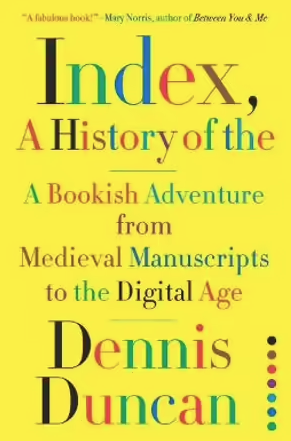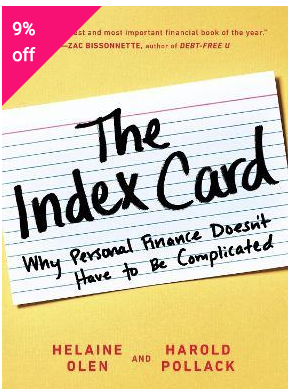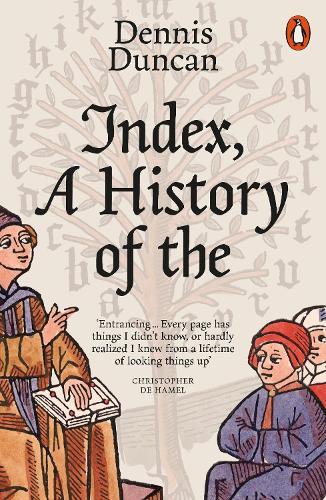The Index, A History ( 2022) by Dennis Duncan
Good Reads meta-data is 340 pages rated 3.71 by 1,086 literatizens.
Genre: nonfiction
Verdict: a nerd’s delight
Tag line: You say indices and he says indexes.

No (nonfiction) book is complete without one, and I have been disappointed by its occasional absence. We’ve used many of them without a thought to origin or evolution. We assume many things about the index, and each has a long and vexed evolution.
We assume these things. Works of fiction do not have an index. Well, some times they have had. Now they don’t. Why not?
We assume the index is much shorter than the text it navigates. Concordances from whence the chrysalis of the index emerged were sometimes longer than the texts they recorded. At least one index grew so large at 100,000 words that it was preceded by an index to the index.
We assume an index is a truthful and accurate reference to the text. Believe it or not that has not always been the case. Novelists have added indexes to their novels to imitate nonfiction in some cases. In other cases critics of nonfiction texts have taken the time, trouble, and expense to create a fake index to discredit the work itself. Finally, there are incompetent indexes.
We assume the index is at the back of the book. They are now, but they started at the front. Once they were a selling point and put first to catch the buyer-reader to show how easy and useful this book is. They migrated to the back but left a shadow at the front in The Table of Contents. Oops. French and Italian books have both, and both at the back. German publishers have the table of contents in the front and the index in back like English ones.
We assume the index is arranged in alphabetical order yet an index to a Roman text might have been hierarchical in order of importance. There is an index to the poems of Emily Dickinson which is based on the shape and size of the paper on which the verse was scrawled. Even when the alphabet applies, is it to be word order or letter order? It makes a difference.
We assume an index is an aid to finding topics in the text but not a substitute for the text. Yet some indexes have appeared without a text. Others have hived off from the parental text and continued shelf life on their own.
We assume a Biblical index is made by human intelligence (HI) that will locate the fable of the prodigal son, though the text of the fable does not use the word ‘prodigal.’ To show just how important that humanity is, this book itself has two indexes, one done by AI software and one done by HI software of one Paula Clarke. The difference is obvious.
Each of these verities has emerged from a kaleidoscope of false starts, rivals, dead ends, pitfalls, and more. Along the way other navigational tools were spawned like the Readers Guide to Periodical Literature on which I suckled.

There are many anecdotes and stories. One stands out. A Berkeley professor’s lifework was to make a concordance to John Dryden poetry. Prof plodded away at this filling 63 shoe boxes with 3 by 5 inch index (!) cards and then he died in 1951. To salvage the work another member of the department took it on to find that among the million or so entries many were garbled, incomplete, water stained to illegibility, disordered, inconsistent in terminology, chewed by some creature(s) great and small, incomplete, while still others were sun-bleached. Hercules paled at the labour but not Josephine Miles. After some years of effort, she described the problem to an electrical engineer while canoodling, and – cutting to the end – the index cards were converted to machine readable punch cards. Just don’t drop the box! Machine readable came to the rescue by reducing the effort for human reading so that she could concentrate on solving the problems.

Being a reader and writer has given me some experience and interest in the subject of navigating books and using indexes.
- Oddly, some Kindle books cannot be navigated on the Kindle management website but can be searched on a Kindle device with the app. It would easier for me to search on the desktop using the Kindle Management site because I might want to check something a dozen or more titles for one point. On the bright side searching is possible.
- The standard but not universal navigation locator for Plato and Aristotle are Stephanus alphanumerics. They were originated in Geneva by a printer in 1578. Yet our author discusses Plato’s Phaedras and it is possible, even likely, the text he used had these marginal notes, e.g., 514c. Yet there is nary a word about these numbers with letter tags.
- Books by the likes of Thomas Hobbes and Jean Jacques Rousseau have no index. Subsequent publishers have made them in varying qualities with duplicated effort. The index to the Penguin edition of Hobbes’s Leviathan does not apply to Blackwell printing. By the way, Samuel Richardson brought out two printings of his whopper novel Clarissa with different page numbering. He then compiled an index, and since it would be unfair to prefer the page numbers of one edition to the other, he solved that problem by omitting page numbers altogether from the index. The result was then equally useful to purchasers of either printing. Is that logical Mr Spock?
- Many Kindle versions of printed books only show locator numbers and not page numbers, yet many of the same publishers require authors to cite page numbers in references. Square that circle.
- Moreover, some Kindle versions that do show page numbers do not match the page numbers in the printed text. A passage ascribed to page 141 on the Kindle edition is not found on page 141 of the same printed text but on page 167. Go figure
- I have four indexes to my name for four books. The first I did myself in haste and it was nothing but a mirror of table of contents. Shame on me. The second was done by the publishers in Philadelphia and I only saw it when it was published. The third was done by the co-author who volunteered to do it! Best came last when the fourth was done by professional indexer in Scotland. A fifth book will be done by a pro at HI.
Pedants note. ‘Indices’ are for scientists, he says, while indexes are for readers. No he does not mention in my consciousness the eponymous index cards but refers often to slips of paper in describing the making of indexes. By the way indexes exclude function words like ‘if,’ ‘but,’ and, ‘and.’ They also exclude adjectives and adverbs and pronouns, and concentrate on nouns. Then there are subheadings and cross references…but not now.

